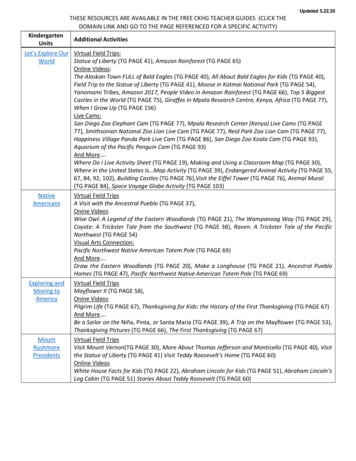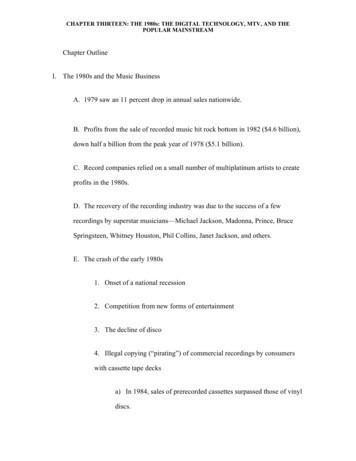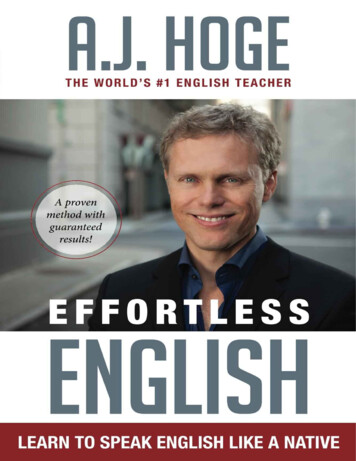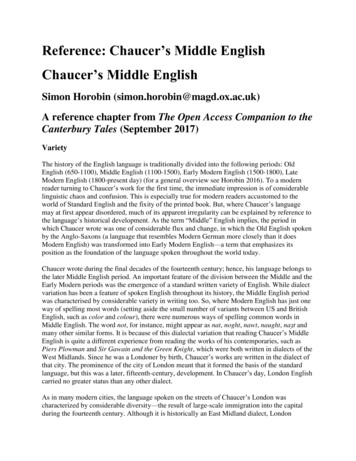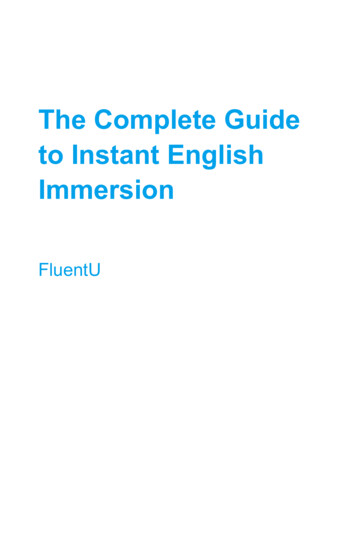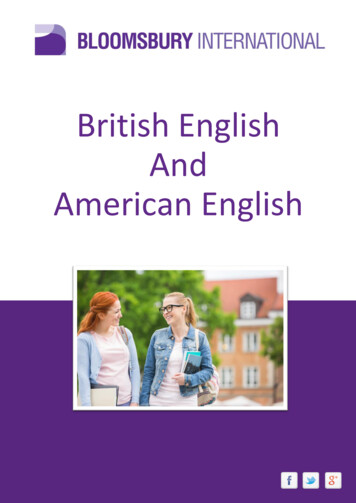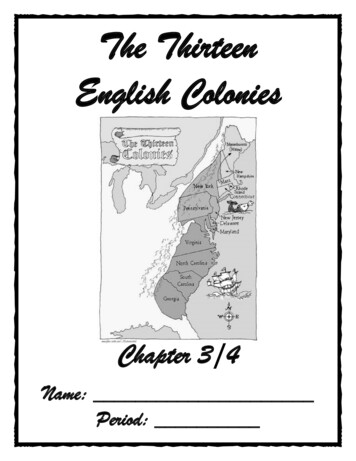
Transcription
The ThirteenEnglish ColoniesChapter 3/4Name:Period:
Social Studies 7Chapter 3/4: The 13 English Colonies (1630-1750)Theme:The thirteen English colonies were founded between 1607 and 1733. The colonists of thesedifferent colonies hoped to find different things in the “New World.” Some sought economicopportunities while others left England for political or religious reasons. Regardless, the new Englishcolonies grew rapidly. The colonies can be broken up into three different geographic regions: the NewEngland colonies, the Middle colonies, and the Southern colonies. Each region developed its owneconomy, form of government, and society.Objectives: At the end of this unit, students will be able to: Describe and compare colonial objectives of European nations and the methods they used to achievethose goals.Explain the geographic factors that helped shape where colonists settled and the economies thatdeveloped.Identify and evaluate the factors that led to the early successes of failures of English colonization.Explain the religious, economic, and political reasons that motivated people to resettle in NorthAmerica.Compare the geographic, political, religious, and social characteristics of the New England, Middle, andSouthern colonies.Identify, explain, and criticize the factors that led to the development of eighteenth-century Americanslavery; examine the experiences of slaves in eighteenth-century North America.Identify and explain the events that led to the development of democracy in the English colonies;explain the significance of the House of Burgesses and the Mayflower Compact; summarize theessential ideas of the Mayflower Compact.Read, examine, and interpret charts and maps related to the period.Analyze the primary source documents related to the period.Chapter Outline:I.II.III.IV.V.VI.VII.IntroductionColonial RegionsFounding the Original 13 ColoniesTriangular TradeColonial Government and LifeMiddle Passage and SlaveryReviewProbable Time Frame: Two weeks, Test is onNext Chapter: Chapter 3/4 DBQ Essay1.
Review SheetWrite the founder(s) of each colony on the line.MassachusettsNew HampshireRhode IslandConnecticutNew YorkNew JerseyPennsylvaniaDelawareVirginiaThe CarolinasMarylandGeorgiaDefine the following ny:5.)Navigation Acts:6.)Smuggling:7.)Religious Toleration:8.)Patroon:9.)Racism:10.)Indentured Servant:11.)Slave Codes:12.)Proprietary Colony:13.)Royal Colony:14.)Mayflower Compact:15.)House of Burgesses:
16.)Middle Passage:17.)Triangular Trade:18.)Bacon’s Rebellion:19.)Theocracy:20.)Apprentice:21.)List the colonies of each region:New 22.)Fill out the following chart.Colonial RegionLandClimateWays of Making MoneyNew EnglandMiddleSouthern3.
4.23.)What were the qualifications to vote in the colonies?24.)Describe what happened when John Peter Zenger wrote an article criticizing the governor:25.)Fill in the trade goodstravelling betweeneach location as partof the TriangularTrade.
5.
THE 13 ORIGINAL COLONIESDirections: Complete the following chart using your text book pages 71, 77, and84.NEW ERNCOLONIES
Directions: Clearly label each colony. Next, shade in the New England Colonies,the Middle Colonies, and the Southern Colonies three different colors. Fill in thekey with the colors that you labeled each set of colonies. Use pg. 74, 80, 86from your textbook to help you.KeyNew England ColoniesMiddle ColoniesSouthern Colonies7.
The Colonial Environment and Its Economic limaterocky,long coldforested, poor winters, verysoilshort growingseasonfertile rivermilder winters,valleyslonger growingseasonflat coastalplains, broadrivers, fertilesoilwarm, moistsummers, veryshort and mildwinterWay of MakingMoneyFishing, whaling,shipbuilding, lumberFarmed, grewgrains: Wheat, Rye,and Barleyplantations (largefarms) where rice,indigo, and tobaccowere grownDirections: Base your answers to the following questions on the chart seen above andyour knowledge of social studies. Please answer in complete sentences.1. What are the three colonial regions?2. Why might the New England region make its money by doing things otherthan farming?3. Explain a difference you notice about the crops grown in the Middle regionand some of the crops grown in the Southern region.8.
4. Why might the New England region be more successful than the Southernregion at fishing, whaling, shipbuilding, and lumbering?5. Based on the chart and what else you have learned, explain how geographycan affect the economy or way people make money.9.
Puritans/Pilgrims3.2.Reason olics”JohnWinthrop:DescriptionWhat happened to those whoopposed the governor?Theocracy:Spoke out for: Holy Experiment:William Penn Set up a safe haven for QuakersBelieved in: Why?Key PeopleThe Thirteen English ablished a safe place forCatholics. Why?LordAct of Toleration:10.
11.EconomicReason forSettlingFarming LandCoastal Land forPennsylvania(Trade & Fishing)Coastal Land forMassachusettsMake money forthe hn SmithStrict Rule:Key PeopleDescriptionWhat makes North and SouthCarolina different?Why Founded:A colonyWhy Founded:Why Founded:Bacon’s Rebellion:Why FoundedThe Thirteen English Colonies
ReasonforSettlingPoliticalEconomicReasonTo limit thepower of theChallenged Governor’sAuthorityReligiousPeople upset underDutch RulePatroon:Prison Reform“Buffer” againstSpanish FloridaKey PeopleThomasHookerDescriptionOriginally a colony.How did it become English?:Power: Patrons Duke of York AssemblyProprietary Colony:JamesWhy Founded:Oglethorpe(Former Soldier)PeterStuyvesant(Dutch)Roger Williams How did Williams get the land?:Did not believethe King could: Religious Toleration:Set up new government/colony.Fundamental Orders of Connecticut:Banished from Massachusetts Bay:The Thirteen English ColoniesColonyConnecticutRhodeIslandNew YorkGeorgiaGift to friends of the New JerseyKingRoyal Colony:12.
13.
The Original Thirteen English ColoniesReason(s) for SettlingType of EconomyDirections: Fill in the following chart about each colony. For Reason(s) for settling, list political, religious, or economic AND thespecific reason each colony was settled. For Type of Economy, consider the region the colony is a part of (New England, Middle,or Southern), and list the primary ways that money was earned for that colony.Colony14.
15.ColonyReason(s) for SettlingType of Economy
Triangular Trade gation Acts:SMUGGLING:
Constructed Response QuestionMayflower CompactHistorical Context: The Pilgrims who came to America in 1620, were mainly a group ofChristians called Separatists. Because of the harassment by the government in England,one group of Separatists had moved to the Netherlands in 1608, but became frustratedwith conditions there and decided their hope lay in the new land of America. Afteranchoring inside the tip of Cape Cod (in Provincetown harbor) The Mayflower Compact,"the first plan for a self-determining government in America", was drawn up and signedby 41 men aboard the Mayflower on November 11th, 1620.This agreement was believed to be necessary because there were rumors that some of thenon-Separatists, called "Strangers," among the passengers would rebel against thePilgrims if they landed in a place other than that specified in the land grant they hadreceived from the London Company. The compact became the basis of a temporarygovernment in the Plymouth Colony. After it was signed, the Pilgrims elected JohnCarver as their first governor. They were to meet in a yearly "General Court to elect thegovernor and assistants, enact laws, and levy taxes."IN The Name of God, Amen. We, whose names are underwritten, the Loyal Subjects ofour dread Sovereign Lord King James, by the Grace of God, of Great Britain, France, andIreland, King, Defender of the Faith, etc. Having undertaken for the Glory of God, andAdvancement of the Christian Faith, and the Honor of our King and Country, a Voyageto plant the first colony in the northern Parts of Virginia; Do by these Presents, solemnlyand mutually in the Presence of God and one another, covenant and combine ourselvestogether into a civil Body Politick(temporary government), for our better Ordering andPreservation, and Furtherance of the Ends aforesaid; And by Virtue hereof do enact,constitute, and frame, such just and equal Laws, Ordinances, Acts, Constitutions, andOffices, from time to time, as shall be thought most meet and convenient for the generalGood of the Colony; unto which we promise all due Submission and Obedience. InWITNESS whereof we have hereunto subscribed our names at Cape Cod the eleventh ofNovember, in the Reign of our Sovereign Lord King James of England, France, andIreland, the eighteenth and of Scotland, the fifty-fourth. Anno Domini, 1620John CarverWilliam BradfordEdward WinslowWilliam BrewsterIssac AllertonMyles StandishJohn AldenSamuel FullerChristopher MartinWilliam MullinsWilliam WhiteRichard WarrenJohn HowlandStephen HopkinsEdward TilleyJohn TilleyFrancis CookeThomas RogersThomas TinkerJohn RigdaleEdward FullerJohn TurnerFrancis EatonJames ChiltonJohn CrackstonJohn BillingtonMoses FletcherJohn GoodmanDegory PriestThomas WilliamsGilbert WinslowEdmund MargesonPeter BrowneRichard BritteridgeGeoroe SouleRichard ClarkeRichard GardinerJohn AllertonThomas EnglishEdward DoteyEdward Leister17.
1. What is the Mayflower Compact?2. Why did the Pilgrims think the compact was necessary?3. Using the context clues, what do you think “compact” means?4. 41 men signed the Mayflower Compact. Why do you think the women didn’t sign thedocument?5. Can you think of any other famous documents in history that may share somesimilarities with the Mayflower Compact?Adapted rims.htmOutside Information***18.
Colonial LifeWhat was life like in the colonies?It depends on who you were and where you lived Most people lived on with their .Many families were large by today’s standards.Why might it be helpful to have a large family on your farm?What did you do?Women: who your parentschose Your andbecame yourhusband’s Bear and raise many chores(laundry, cooking, making clothes,tending animals In a town you may run aor anMen: You might have a ,such as a carpenter, blacksmith,wheelwright, tanner, butcher,cooper, etc. On the farm you tended the, collectedfirewood, repaired buildings, builttools and . You controlled the family’sChildren: You did not have to start workinguntil about the age of When you came of age, youwould help with andchores Boys who learned trades wouldbecome an apprenticeApprentice:andMany people came to the colonies seeking opportunity. In Europe, was asign of wealth. In the colonies, there was plenty of land to go around.19.
Colonial LifeIn the colonies, there were several that developed.Gentry: these were the class of colonial society. They were wealthyplanters, merchants, ministers, royal officials, and successful lawyers. They werefew in but very politically and socially.Colonists like Washington, Adams, Jefferson, and Hamilton were gentry.Middle Class: most colonists were considered middle class. This group includedindependent and . They were mostly , butthere were a few free African Americans as well.The middle class provided hope for the . Unlike in Europe, in thecolonies one could hope to eventually buy a piece of and move up thesocial scale to become middle class.Indentured Servants: these people signed a to work for a numberof years in exchange for passage to the colonies. They were not , but afterthe contract expired, they were .Colonial Government: Most colonies were run by governors. Virginia had the firstlegislature with its in 1619. Massachusetts soonfollowed, creating the in 1629. Pennsylvania created ain 1701. By 1760, all of the colonies had some form ofelected legislature. They sometimes did not agree with the governors who wereappointed by the .20.
Colonial LifeRight to Vote: The right to vote in colonial times was somewhat limited. To vote, aperson had to be:1.2.3.4.5.This meant that about 50-75% of white men in the colonies could vote (which was amuch higher percentage than in England).John Peter Zenger: An interesting case about the colonists’ rights came about whenJohn Peter Zenger published a newspaper article criticizing the governor of. He was charged with , which is publishingstatements that damage a person’s reputation.Today, you can only be charged with libel if what you wrote is not .However, in 1735 that did not matter. Zenger went to trial and his lawyer, AndrewHamilton, argued that articles based on fact should not be considered libel. The juryagreed and found Zenger .This case helped establish the belief in the important right of ofthe .21.
The Trans-Atlantic Slave TradeWhere did most African slaves come from?Most slaves came from and Africa.Many slaves were captures as from warsbetween tribes.How many slaves were brought over?Somewhere between slaves werebrought to the “new world” from Africa over the 300-400 years of the slave trade.What made the journey so terrible?Many slaves, sometimes , were cramped intovery small spaces.Slaves were together and had little room to movearound.Slaves were kept below deck. It was , , andhorrible.How many Africans died?It is impossible to know exactly how many Africans died because of the slavetrade.It is estimated that around slaves died during or shortlyafter the voyage across the Atlantic (or 10-20% of those brought on the boats).It is impossible to estimate how many Africans were killed during wars takingplace in Africa to capture slaves.We can safely estimate that Africanlives were "lost" (to death or slavery) due to the slave trade.22.
The Trans-Atlantic Slave TradeIndentured ServantAfrican Slave Colonists saw advantages to using slaves instead of indentured servants:1.2.3.4.Slave Codes:The system of slavery existed because ofRacism:23.
Chapter 3/4: The 13 English Colonies (1630-1750) Theme: The thirteen English colonies were founded between 1607 and 1733. The colonists of these different colonies hoped to find different things in the “New World.” Some sought economic opportunities while others left England for political or religi
